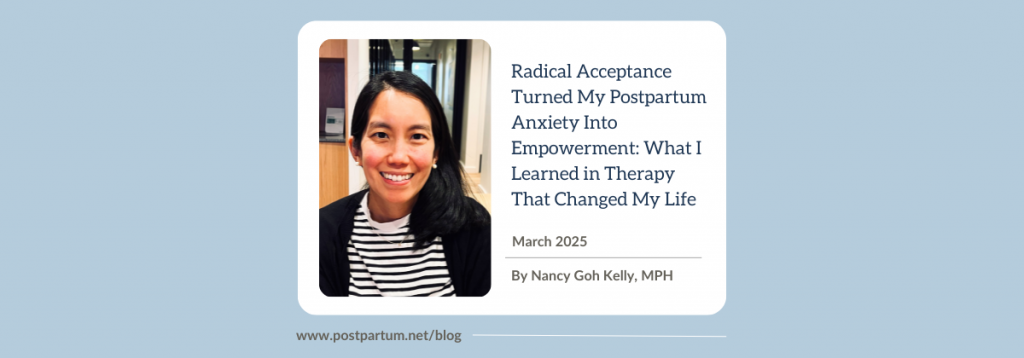What I Learned in Therapy That Changed My Life
By Nancy Goh Kelly, MPH
I learned something in therapy that changed everything: radical acceptance.
First, some context.
I have two little ones–a 3-year-old and a 1-year-old. Mental health and wellness have always mattered to me. After my first baby, I became a local coordinator for Postpartum Support International (PSI).
Before kids, I prioritized sleep, exercise, and a healthy diet. Therapy got me through tough moments, so I knew the power of support.
After my first, I had mild postpartum anxiety, but found support through couples counseling, life coaching, and a peer support group.
Then my second baby came, and anxiety hit harder.
A few weeks in, I knew I needed help.
I’m so grateful for the PSI community–especially the compassionate support from the coordinator team (thank you, Melissa Bentley, Joshua Maze, and Stacey Figg!)—and for the PSI Provider Directory, which led me to the right therapist.
Therapy was a game-changer. Again.
What postpartum anxiety looked like for me.
Postpartum anxiety isn’t just extra worrying. PSI defines anxiety as constant worry, racing thoughts, feelings of dread, and fears that feel hard to control. It can hit anytime in the first year after birth.
At three months postpartum, I was diagnosed with generalized anxiety–mostly fueled by sleep deprivation.
The exhaustion consumed me.
Every morning, my smartwatch dictated my mood. I obsessed over every sleep cycle. I tracked every feed and nap, desperately looking for patterns for better sleep.
I refused my husband’s help because I wanted to control the nighttime routine.
I worried my baby’s cries would wake my toddler.
I snapped at my husband, lost patience with my toddler, and avoided social plans to nap.
And when I finally had the chance to sleep, I couldn’t because of all the worrying.
I wasn’t myself.
The therapy session that changed everything.
After a few therapy sessions, my therapist told me about radical acceptance.
She explained the difference between pain and suffering. Pain is what happens when things go wrong–exhaustion, stress, frustration. Suffering is when we resist that pain–wishing things were different, obsessing over what we can’t control.
Radical acceptance meant sitting with pain without letting it turn into suffering.
She gave an example: Imagine a bride who wakes up to rain on her wedding day. She can stew in frustration–or she choose to accept the reality and enjoy that day.
That changed everything for me.
How I started practicing radical acceptance.
Instead of ‘Why won’t my baby sleep? It’s not fair’, I reframed my thinking:
- Accept the reality: Newborn sleep is unpredictable and sleep deprivation is part of this season. I don’t have to like it, but I can stop resisting it.
- Feel the emotions: Exhausted? Frustrated? Resentful? All valid. Suppressing them doesn’t make it go away.
- Stay present: I stopped replaying bad nights or dreading future ones. When my baby woke, I took a deep breath and reminded myself it wouldn’t last forever.
- Find gratitude: In the dark, exhausted hours, I reminded myself: My baby is healthy. I get to be there for him. I can kiss his soft cheek before laying him down.
- Be kind to myself: Sleep anxiety is common. I reminded myself I was doing my best, and I was still a great mom.
- Let go of expectations: My daughter slept through the night at 11 weeks. My son took longer. Comparing them wasn’t helping anyone.
Things weren’t perfect and I still had anxiety. But when my baby cried, I didn’t spiral into frustration and hopelessness.
I got up, soothed him, and moved on.
Even without much sleep, I felt better.
Radical acceptance is empowering.
It’s not easy to admit how much I struggled. But I’m sharing this so other new moms feel less alone.
1 in 5 new moms experience a perinatal mental health disorder. But 75% don’t get the help they need.
Motherhood is humbling. It’s full of things we can’t control, and it’s easy to get stuck in the ‘this isn’t fair’ mindset.
Radical acceptance has become my new mantra. There’s something about the word ‘radical’ that feels empowering. Now, I use it for everything–tantrums, bedtime battles, potty training, sick days, and parenting disagreements.
It’s amazing how that’s made more room for joy.
If you’re struggling, reach out. You’re not alone. Contact Postpartum Support International’s Helpline at 1-800-944-4773.
Perinatal Mental Health: Signs, Symptoms, and Treatment
PSI Provider Directory
Get Help










